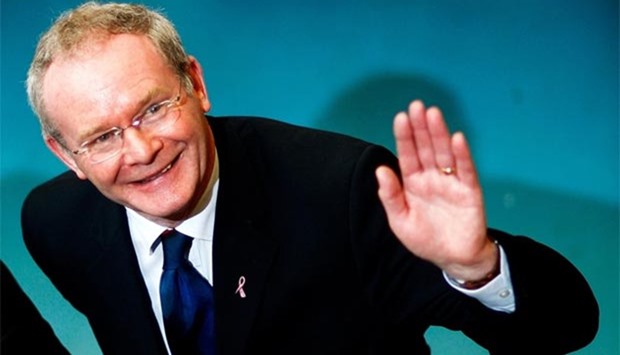Northern Ireland's former deputy first minister and one-time Irish Republican Army commander Martin McGuinness has died aged 66, his Irish nationalist party Sinn Fein said on Tuesday.
McGuinness played a central behind-the-scenes role in negotiating a peace deal in 1998 which brought to an end three decades of conflict in Northern Ireland which killed more than 3,500 people."It is with deep regret and sadness that we have learnt of the death of our friend and comrade Martin McGuinness who passed away in Derry during the night," his Sinn Fein party, which is opposed to British rule in Northern Ireland, said in a statement.
The BBC said he had died of a rare heart condition.
"While I can never condone the path he took in the earlier part of his life, Martin McGuinness ultimately played a defining role in leading the Republican movement away from violence," Prime Minister Theresa May said in a statement.
"In doing so, he made an essential contribution to the extraordinary journey of Northern Ireland from conflict to peace," she said.
Colin Parry, whose 12-year-old son Tim died in an IRA bomb in the English town of Warrington in 1993, said he could not forgive the IRA but paid tribute to McGuinness's "desire for peace".
McGuinness was "a brave man, who put himself at some risk" from more hardline members of the republican movement, Parry was quoted by the Guardian newspaper as saying.
McGuinness had resigned from politics in January, citing a serious illness and a breakdown in relations with the rival Democratic Unionist Party.
Sinn Fein refused to appoint a replacement due to the row with the pro-British DUP, triggering local elections this month in which it made major gains.
The two parties are currently deadlocked, meaning that the British government could impose direct rule of Northern Ireland from London within weeks.
Ten years ago in May McGuinness had made history by entering a government with his once bitter foe, Ian Paisley of the DUP.
The decision to share power was a key part of the peace process in Northern Ireland.
Former prime minister Tony Blair, one of the architects of the 1998 peace deal, said he would not have been able to do it without McGuinness.
"For those of us able finally to bring about the Northern Ireland peace agreement, we know we could never have done it without Martin's leadership, courage and quiet insistence that the past should not define the future," Blair said in a statement.
McGuinness was a commander in the IRA paramilitary group that fought for the province to leave Britain and join the Republic of Ireland to the south.
In a memorable gesture that would once have been unimaginable, he shook hands with Queen Elizabeth II during her visit to Belfast in 2012.
Sinn Fein leader Gerry Adams called his former colleague a "passionate republican who worked tirelessly for peace and reconciliation and for the re-unification of his country.
"Throughout his life Martin showed great determination, dignity and humility and it was no different during his short illness," he said.
Irish President Michal Higgins said: "The world of politics and the people across this island will miss the leadership he gave, shown most clearly during the difficult times of the peace process".

